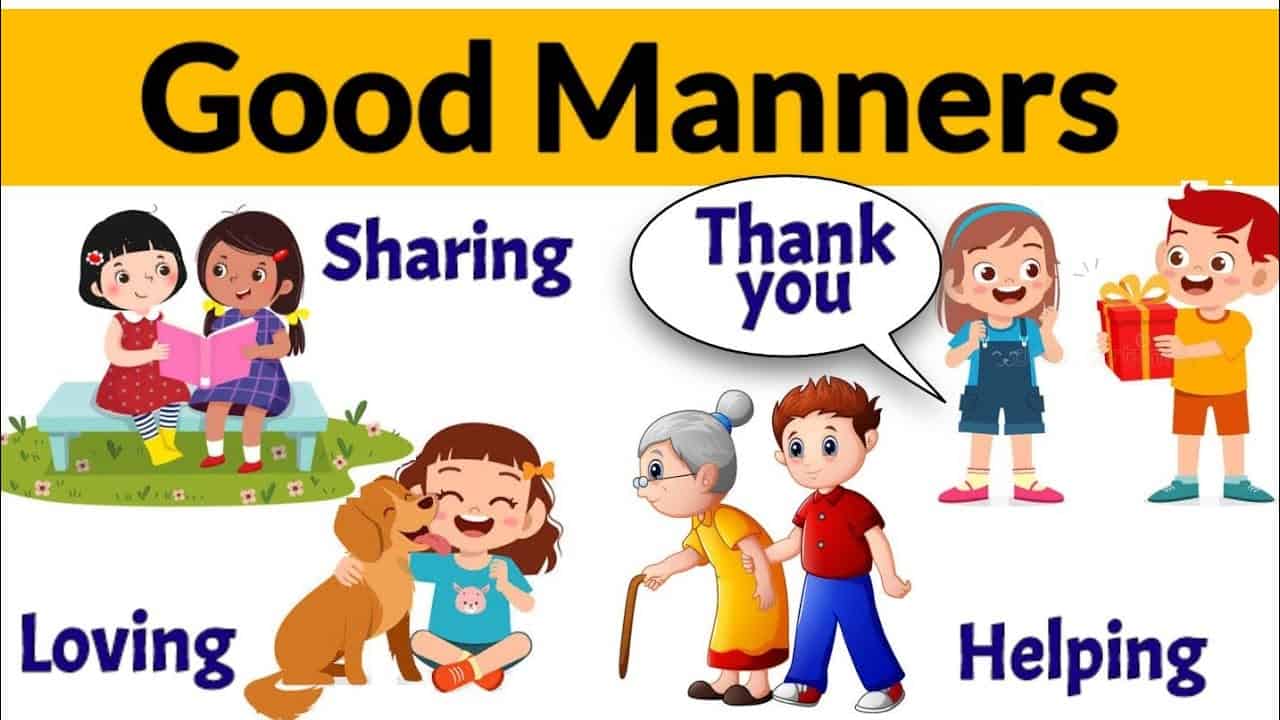Today we’re talking about the importance of teaching children and young people good manners and etiquette. It’s so important to set a good foundation for our kids when it comes to being respectful, considerate, and kind towards others. Good manners can help build positive relationships with those around us, as well as make a great impression on others. And teaching them how to show respect for others and their feelings will set them up for success in life. To help young people learn manners and etiquette, we’ve written this new short book: Manners and Etiquette for Kids: A Fun Guide to Being Polite and Respectful – please copy and share this, it’s under the Creative Commons Attribution-NonCommercial-ShareAlike license. Also, see 30 more Resources for Teaching Children Manners below.
20 things that children should know by the time they turn 15
- Greet people with a smile and a kind word when you meet them.
- Say please and thank-you when asking or receiving something from someone else.
- Respect other people’s personal space – don’t invade it without permission.
- Use polite language – no swearing or name calling allowed.
- Listen carefully before responding so that you understand what is being said correctly.
- Be courteous even if someone is rude towards you – two wrongs don’t make a right.
- Make eye contact with the person speaking to show interest in what they’re saying.
- Respect other cultures, beliefs, opinions etc., even if they differ from yours.
- Apologizing sincerely whenever appropriate is key to fostering healthy relationships.
- Don’t interrupt conversations and offer compliments instead!
- Being humble, avoiding bragging, and giving credit where due will help you build strong connections with others.
- Asking questions politely and sharing are also important elements of a good relationship.
- When interacting with people don’t be too competitive and respect your elders also.
- Help out around the house or clean up after yourself when needed.
- Show gratitude for what you have in life.
- Take responsibility for our actions and keep your promises.
- Following instructions carefully shows respect while speaking clearly demonstrates patience.
- Demonstrating empathy helps us understand each other better.
- Solving conflicts peacefully allows us to move forward without animosity or resentment.
- Practice random acts of kindness often too.
At the end of the day it really boils down to instilling values within our kids that will stay with them throughout life no matter where they go! So let’s all do our part in helping shape future generations into responsible citizens who know their way around both formal and informal settings alike. The following are important areas that parents and teachers should focus to help children learn and understand manners and etiquette.
- Greetings: Teaching children and young people to greet others properly is an important aspect of manners and etiquette. This means teaching them to say “hello,” “goodbye,” “please,” and “thank you” when interacting with others. Additionally, children and young people should be taught to make eye contact and smile and say “Hi, my name is [name]” when greeting others and introducing themselves
- It is critical for youngsters to understand the value of personal space and privacy. They should learn to respect other people’s personal space and refrain from invading it without permission. Standing too near to someone, touching someone without permission, or gazing at someone over a lengthy amount of time are all examples of this.
- Table Manners: Teaching correct table manners to children and teens is an important aspect of manners and etiquette. This involves teaching toddlers how to use utensils properly, hold a drink properly, and chew and swallow with their mouths closed. Children and teenagers should also learn to use napkins, stop talking with their mouths full, and reach across the table for items.
- Children should be taught to be aware of their surroundings and to observe others when it comes to public behavior. This includes things like speaking quietly, not running or playing in public, and maintaining personal cleanliness. They should also learn not to throw things and pick up after themselves.
- Another key part of public manners and etiquette is correct behavior on public transit. Children should be taught to give up their seats to those in greater need, such as the elderly or pregnant women, and to be considerate of others’ space whether sitting or standing. They should also be taught to speak quietly and to avoid noisy or disruptive conduct.
- Telephone etiquette: In today’s digital world, it is important for children and teens to understand basic phone etiquette. This involves educating children not to disrupt others when on the phone and not to speak loudly in public. Furthermore, toddlers and teenagers should learn to say “please” and “thank you” when requesting to use someone else’s phone, and they should not leave their phones on the table during meals.
- RSVP: Children and young people should be taught the importance of RSVPing. This means teaching them to respond promptly to an invitation to an event and let the host or hostess know whether or not they will be attending.
- Being a good host and guest is an important life skill for children and young people to learn. Teaching them the difference between host and guest behavior can help them become more aware of how their actions affect others in social situations. When they are guests, it’s important to be respectful of the property, clean up after themselves, and be mindful of the hosts schedule. As hosts they should strive to make their guests feel welcome by being gracious with their hospitality!
- Another important aspect of manners in social situations is knowing how to start and carry on a conversation. Children should be taught how to ask open-ended questions and how to actively listen to others when they are speaking, and look people in the eye, speak clearly and avoid interrupting or talking over others. They should also be taught how to respond appropriately to different types of conversation, such as how to make small talk and how to engage in deeper conversations.
- When it comes to digital communication, children should be mindful of tone and language and should learn to avoid using capital letters, exclamation marks or other punctuation marks that may come across as aggressive or rude. They should also learn email etiquette and to proofread their messages before sending and be clear and thoughtful in their communications.
- Children should also be taught about privacy and security. They should be taught about the importance of keeping personal information private, not sharing private information with strangers, and understanding the potential consequences of sharing personal information online.
- Finally, it is critical that children and young people learn that manners and etiquette are about more than just obeying rules; they are also about demonstrating respect and regard for others. Children will acquire a sense of empathy and awareness of other people’s feelings and needs as they study and practice excellent manners and etiquette in social circumstances.
Manners and etiquette are essential in all aspects of life. By respecting others, behaving politely in social situations, being considerate in public and paying attention to tone and language in electronic communication, children and young people can better relate to others and behave politely and appropriately. Encourage them to remember to always think before you act and be kind and considerate to those around you. These small gestures of courtesy and consideration can have a big impact on how we interact with and are perceived by others. I believe that by instilling good manners and etiquette in children and young people, we not only help them become better individuals, but also build a more harmonious and considerate society.
Resources for Teaching Children Manners and Etiquette (all are pdf)
- 4 Games/Activities that Teach Kids Manners
- 24 Ideas for Instilling Manners in Children
- Anger Management Worksheets
- Book of Etiquette by Emily Post
- Christian Grooming and Manners
- Cover Your Cough or Sneeze poster
- Different Types of Touching Story
- Disrespect, Its Not OK, Curriculum Lessons, Grades Pre-K-5.
- Early Childhood School Manners Lesson
- Etiquette Coloring Book
- Four Tricks for Teaching Manners to Young Children
- Good Manners and Etiquette Handout
- Guidelines for Manners to Teach Kids poster
- Helping Your Child Be a Responsible Citizen, with Activities
- How Can I Start Teaching My Child Manners
- Internet Safety Curriculum Lessons, Grades K-12
- Life Skills Games, Grades K-6
- Manners and Etiquette for Kids: A Fun Guide to Being Polite and Respectful
- Manners and Etiquette Slides, Grades 1-5
- Manners Coloring Book
- Manners For Life, Middle School
- Netiquette for Kids
- Phone Etiquette Worksheet
- Please and Thank You Worksheet
- Respect Worksheets
- Responsible Behavior Guidelines for the Internet Lesson
- Table Setting and Etiquette Presentation
- What Does the Bible Say About Manners
The Be Nice Book Series, Pre-K – 1st Grade
10 Etiquette Guidelines for Young People
- Remember Your ABCs – Always Be Caring, Comforting, and Courteous! Showing respect towards others will come back around to you in many ways – from your family members to your team members or even those you associate with daily.
- Do Not Call Attention To Yourself – If all else fails just remember not call attention yourself by following the lead of whoever is leading the setting or event that you’re attending (like turning off your cell phone ringer!). People should know who you are because of your intelligence, talent, helpfulness rather than bad manners!
- Smile and Make Eye Contact – Smiling shows happiness while looking someone directly in their eyes shows sincerity as well as interest which can build trust between two people quickly . A smile paired with eye contact goes a long way when it comes making friends or networking at events so don’t forget these two simple steps when practicing good etiquette!
- Early is On Time – Leaders respect time and make sure they’re where they need to be when they need to be there! Don’t let yourself get left behind by being late or procrastinating on important tasks.
- Never Greet from Your Seat – Show respect for others by rising up when you meet them or greet them, no matter who the person is! It’s always nice gesture that goes a long way in making a good impression on people around you.
- Gossip About the Success of Others – Instead of spreading rumors or negative news about people, why not focus your attention on their successes? Spread positivity instead and help build others up with your words rather than tear them down with gossiping tongues!
- Be Pressed & Polished – No matter what style trends come and go, looking neat never goes out of fashion so make sure you dress appropriately each day according to the occasion while keeping yourself pressed & polished at all times!
- Dining Etiquette – It is always important to remember that chewing with your mouth closed, keeping elbows off the table, and waiting until everyone is served before beginning are just some of the basics.
- Use “We” instead of “Me” – Leaders know how important it is to talk about “we” not “me”. So, turn the “m” in “me” to a “w” for “we”, and try to use more inclusive language like “we”, “us” or “our” instead of words such as “I”, “me”, or “my”.
- Show Gratitude – Showing appreciation for others should also be practice in any situation. Whether someone gives you a physical gift or something more valuable such as their time and energy, sending a handwritten thank-you note expressing your gratitude will never go unappreciated.
- P.S. – By following proper etiquette and creating your own unique brand, you can make good impressions on others. When you are kind and hospitable towards others, they will remember it fondly and associate those positive feelings with you, your family, or others you are with. In essence, if you cultivate an atmosphere of kindness and respect for one another then you’ll naturally attract more people into your life as well as create wonderful memories along the way.
Cell Phone Manners
- Be your phone’s master, not its slave!
- Don’t speak loudly .
- Be courteous to people around you, switch off your phone if it may disrupt a discussion or activity.
- Be mindful of your words, especially if others may hear you.
- Avoid discussing personal difficulties in public.
- Use silent ring mode and leave to talk if it must be on and may disturb others.
- Make no phone calls at the library, theater, church, or from your restaurant table.
- Don’t text during a lesson, class or a meeting.
- Do not transmit private information because it can be sent on to others.
- Driving and talking on the phone should never be done at the same time.
Best Table Manners Advice For Children
- Come to the table with clean hands and face.
- Put your napkin on your lap.
- Start eating when everyone else does, or when given the okay to start.
- Stay seated and sit up straight.
- Keep elbows (and other body parts!) off the table while eating.
- Chew with your mouth closed and don’t talk until you’ve swallowed.
- Don’t make bad comments about the food.
- Say “Please pass the…” instead of reaching.
- Chat with everyone at the table.
- Don’t make rude noises like burpingor slurping.
- Ask to be excused when finished.
- Thank your host or whoever preparedthe meal.
- Offer to help clear the table.
Singing Songs to Learn Manners
Good Manners
Tune: “Twinkle, Twinkle, Little Star”
We say, “Thank you.”
We say, “Please.”
We don’t interrupt or tease.
We don’t argue. We don’t fuss.
We listen when folks talk to us.
We share our toys and take our turn.
Good manners aren’t too hard to learn.
It’s really easy, when you find.
Good manners means
Just Being Kind!
Good Manners
Tune: “My Bonnie Lies Over the Ocean”
Good manners is thinking of others,
Good manners is doing what’s right
Good manners is thinking of others
Good manners always feel right.
Helping, caring,
Sharing with you today, today
Kindness, honesty
Sharing with you today
Table Manners
Tune: “Are You Sleeping”
Chewing quietly, chewing quietly
Do not slurp, do not slurp,
We must say excuse me,
We must say excuse me
When we burp,
When we burp.
Are You Sharing?
Tune: “Are You Sleeping”
Are you sharing,
Are you sharing,
Little ones,
Little ones?
Sharing is caring,
Caring is sharing,
Be a friend!
Be a friend!
Share your Toys
Tune: “Row, Row, Row Your Boat”
Share, Share , share your toys,
share them with your friends
It’s so much fun to share yourtoys,
sharing has no end.
Art Project: Cover Your Sneeze Please
- Materials needed: paper plate, yarn, glue, scissors, construction paper, crayons or markers, and a tissue.
- Use a paper plate to create a face.
- Children can draw or paint faces, add yarn for hair, etc.
- When they are done, trace each child’s hand and glue it to the mouth of the paper plate with a
- tissue in between the hand and mouth.
- Talk with child about using good manners when sneezing.
The ABCs of Aristotle
- It’s important to remember that there are some things you should and shouldn’t do in life. Here are a few helpful tips for you:
- A – Avoid being too amorous, adventurous or arguing too much.
- B – Be careful not to be too bold, busy or babbling on for long periods of time.
- C – Don’t be overly courteous, cruel or care about things more than necessary.
- D – Don’t be dull, dreading situations nor drink alcohol often (if at all).
- E – Don’t to be too excellent or melancholy, nor earnestly pursue anything beyond your abilities.
- F – Make sure you aren’t fierce, familiar but friendly with others around you always.
- G – Be glad and don’t get caught up with vain glory; stay away from jealousy as well.
- H – Haste makes waste so take it slow and don’t put yourself down if something doesn’t go quite the way planed.
- J – Just enjoy yourself without jangling people around what they think is ‘normal’ behavior; also avoid joking about topics which may offend someone else.
- K – Always remain kind while keeping an eye out for any knaves who might try pull one over on you.
- L – Try not to love everything just because it seems nice; likewise don’t give away all your goods either as this can lead trouble down the line.
- M – Don’t be too meddlesome or merry, just do what is asked of you in a measured way.
- N – Don’t be too (an-)nnoying or overly nice either,
- O – Don’t be over the top or too bold.
- P – Avoid praising people in high positions.
- Q – Don’t be quaint or querulous either.
- R – Don’t act riotously, rudely, or in a fit of rage.
- S – Don’t be too weird, too disruptive nor stare too strangely.
- T – Stay away from telling tales and gossiping, and be moderate in all things.
- V – Keep your temper under control by avoiding anger and Vengefulness, and don’t envy others.
- W – Don’t be wild, keep wrath away from you, and try not to waste time or money on things that aren’t necessary.
- Finally – moderation is key! So remember these tips next time you want to show off your best self – they will help ensure that you are never lacking in the end!
Original wording of Aristotle’s ABCs:
- Be not—
- A too Amorous, too Adventurous, nor Argue too much.
- B too Bold, too Busy, nor Babble too long.
- C too Courteous, too Cruel, nor Care too sorely.
- D too Dull, too Dreading, nor Drink too oft.
- E too Elenge, too Excellent, nor too Earnest neither.
- F too Fierce, too Familiar, but Friendly of cheer.
- G too Glad, too (vain-)Glorious, and Gelousy thou hate.
- H too Hasty, too Hare-brained, nor too Heavy in thy Heart.
- J too Jetting, too Jangling, nor Jape not too oft.
- K too Kind, too Keeping, and beware of Knaves’ tricks.
- L too Loth, too Loving, nor too Liberal of goods.
- M too Meddling, too Merry, but as Measure asketh.
- N too (an-)Noying, too Nice, nor too New-fangled either.
- O too Overbold, too Overthwart, and hate thou Oaths.
- P too Praising, too Privy with Princes or dukes.
- Q too Quaint, too Querulous, and Queme thy master.
- R too Riotous, too Revelling, nor Rage too Rudely.
- S too Strange, too Stirring, nor Stare too strangely.
- T too Toiling, too Tale-bearing, for Temperance is best.
- V too Vengeful, too Envious, and (a-)Void all Villainy.
- W too Wild, too Wrathful, nor Waste, nor Wade too deep.
- For a Measurable Mean is best for us all. Learn this or go Lacking.
-love learning -your best ed lessons guide, Scott




